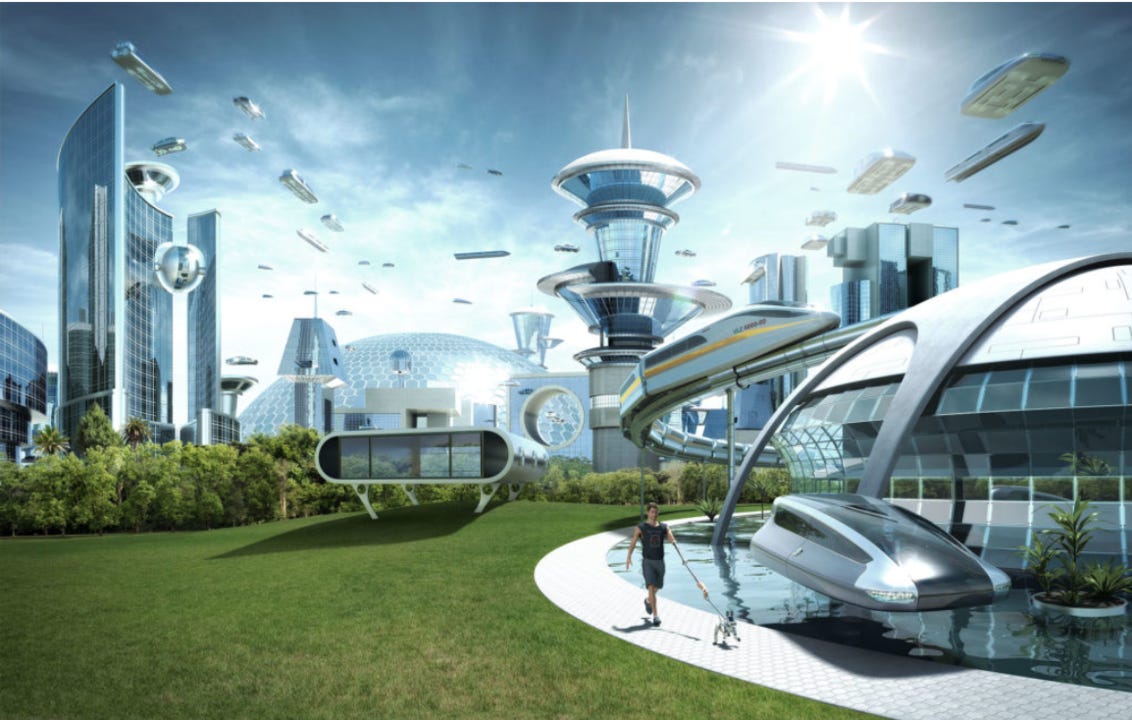Capitalism Has A Future Problem
It doesn't know how to get there.

One reason I’m drawn to Marxism is that it recognizes its limits. Unlike other political, social, and economic ideologies I’ve encountered, socialist thought leaves space for uncertainty about the future. Embedded in Marx’s work was the admission that he didn’t have all the answers. While Marxism provides a helpful framework for analyzing the sources of current problems, it does not decree an iron rule for humanity to follow blindly.
Instead, Marx analyzed the evolution of human society, tracing our development from hunter-gatherers to farmers, to empires, to feudal kingdoms, and, eventually, to industrial capitalism. Though society reset and regressed more than he understood,1 Marx correctly identified that material conditions and contradictions (slave vs. master, serf vs. lord, etc.) were the engine of change. Sitting in the heart of European capitalism on the eve of the Second Industrial Revolution, Marx sketched a framework for humanity to reach what everyone, communist and capitalist alike, envisioned: utopia.
Ask anyone to describe the ideal future, and you’ll hear the same ideas regardless of their political persuasion. A world where everything is free, everyone is equal, there’s no hunger, war, or want, and humanity exists without harming or being harmed by nature. Christians call this Heaven. Nerds (like me) call it Star Trek. Karl Marx called it communism. Unlike his ideological leftist predecessors, who tried to establish isolated communes, Marx articulated a path for all of humanity to reach its common dream. He described an intermediary stage between capitalism and communism where the working class controlled society and decisions were made collectively — socialism. However, Marx was always vague about what socialism and communism would look like. Despite his extensive bibliography, he never described a model socialist society. When the Revue Positiviste criticized Das Kapital for this vagueness, pointing out that Marx didn’t write ‘recipes for the cookshops of the future,’ Marx didn’t contest. He agreed with them. According to the German economist, Marxism was not about shoving a square peg ideology into the round hole of reality, but about reckoning with the state of things, then developing necessary solutions.
"Socialism is not for us a state of affairs, an ideal to which reality must adapt itself. We call socialism the real movement which abolishes the present state of things, and the conditions for this movement result from the premises now in existence." — Karl Marx2
Socialism is the outgrowth of the exploitative nature of capitalism. But what are the specific details of the communist outgrowth of socialism? Will communism come after socialism? Or will humanity need another economic and social structure to overcome unforeseen problems before reaching utopia? Marxism does not try to answer these unknown questions. We don’t know if they’ll even occur, never mind how to solve them. Instead, it provides a framework of egalitarian values and collective will to guide ‘the cookshops of the future’ as they determine the best answers for the problems only they can understand. With good intentions, validated theory, and a rigorous adherence to understanding the material sources of social issues, the Marxist framework is the best I’ve encountered to steer humanity towards our shared dream.
To the best of my knowledge, capitalism has no mechanism for achieving the collective dream of a scarcity-free future. Even at the height of Cold War anti-communism, Americans cherished the idea of utopian communism. Especially when it was in space. Debuting in 1962, The Jetsons captivated audiences with a future that could only be achieved through America’s ideological archenemy. As the benefits of technology are shared amongst society, George Jetson’s full-time job required him to work one hour a day, two days a week, which supported his family and allowed him to obtain the luxuries of a futuristic, 21st-century lifestyle. Both in the 1960s and now, America’s capitalist system has no way to deliver this reality to the inspired audience.
After last week’s article critiquing Ezra Klein and the Abundance movement attracted widespread pushback, I revisited the book to ensure I wasn’t misrepresenting the authors’ claims. In the book’s introduction, entitled Beyond Scarcity, Klein and Thompson paint a view of the resource-abundant future year of 2050. They write:
‘Across the economy, the combination of artificial intelligence, labor rights, and economic reforms have reduced poverty and shortened the workweek. Thanks to higher productivity from AI, most people can complete what used to be a full week of work in a few days, which has expanded the number of holidays, long weekends, and vacations. Less work has not meant less pay. AI is built on the collective knowledge of humanity, and so its profits are shared.’
I’m really not trying to pigeonhole myself as the ‘Anti-Abundance Guy,’ but this line best reflects capitalism’s future problem. The above paragraph cannot materialize through capitalism. Utopia will not be the result of letting the profit motive continue perpetually. How could it? Our economic system doesn’t prioritize the collective good. It centers the profit motive, which occasionally advances humanity as a by-product of maximizing revenue. If we want a collectivist goal, we need a collectivist means.
Klein and Thompson write that their post-scarcity, resource-abundant vision will come from ‘labor rights and economic reforms.’ This fails to recognize what capitalism is. Under capitalism, the means of production (businesses and industry) are privately owned by capitalists; workers have no right to the profit their labor creates. Tesla’s profits fund Elon Musk’s ketamine rages, not healthcare for his overworked employees. There’s no ‘reform’ to capitalism that will spread the profits of AI (or any privately-owned product) throughout society. Capitalists aren’t trying to replace humans with robots so people like you and me can spend less time working. They’re doing it to replace humans entirely, cutting labor costs and increasing profit. This is what capitalism commands them to do. The system produces what it was designed to. Wishing that capitalists will find a conscience, or somehow the government they own will force them to socialize their wealth, isn’t just wishful thinking — it’s suicidal.
Capitalism is a leading cause of climate change.3 For a long time, the most ardent capitalists, usually in the Republican Party, couldn’t find a way to justify deregulation in a warming world. So, they ignored it, claiming everything would magically work out. In the video below, first-term Donald Trump responds to a factual argument about rising temperatures by saying ‘Things will start getting cooler.’ Liberal capitalists, who recognize climate disaster as a legitimate issue, are correct to mock this Republican denialism. But saying our hyper-capitalist society will one day ‘start sharing profits’ and produce a utopian future is equally as ridiculous asDonald Trump saying the planet will magically cool.
To those who think the economic structure of our society only requires some modest tinkering to achieve the post-scarcity utopia, explain to me, how will that happen? Ezra Klein and Derek Thompson paint a picture of profit-sharing America twenty five years from now. At what point will capitalism go from promoting the private ownership of businesses and industry to the collective ownership? 2035? 2045? The Jetsons is set in 2062, a mere thirty-seven years from now. George Jetson works two hours a day. America hasn’t shortened the work week even one hour since the shows’ debut. At what point does that rosy picture of capitalist utopia come to pass? 2080? 2180? 2500? I’d really like an answer. When will the capitalists say, ‘Enough is enough. Let’s share our wealth and tell our employees they have a five day weekend.”? More importantly, why would they do that? Will someone force them to? If so, who? Will they do it out of the kindness of their own hearts?
Capitalism will not deliver utopia, even if we implement Klein and Thompson’s ‘labor rights and economic reforms.’ There is no ‘reform’ to capitalism that will share private profits. To do that, we must fundamentally change the nature of capitalism from one in which the means of production are privately owned to one in which they are collectively owned. ‘To fundamentally change the nature of something’ isn’t reform. It’s the textbook definition of radical. If the Abundance authors want to bring about their espoused dream, then they’re going to have to advocate for a societal evolution beyond capitalism.
Capitalism does not have an answer to its future problem. At least, not one that I’ve heard. If we actually want to achieve the dream of workless utopia put forth in Abundance, The Jetsons, and everyone’s shared dream of the far-off future, we need a path that gets us there. Expecting it to magically happen on its own is as unserious as crossing our fingers and claiming the planet will cool.
There’s no shortage of political content out there, so I appreciate your attention time. If you haven’t yet, make sure you click the ❤️ and subscribe so future articles are delivered to your inbox. If you’re a returning reader and enjoy my work (even sometimes), please consider upgrading to a premium subscription. It’s cheap (one cup of coffee a month), gets you exclusive articles, and ensures I can keep writing content that advances post-capitalist ideas. Thanks in advance!
In Solidarity — Joe
https://en.wikipedia.org/wiki/The_Dawn_of_Everything
https://www.marxists.org/archive/hardcastle/1983/marx_conception1.htm
https://pitjournal.unc.edu/2022/12/24/how-capitalism-is-a-driving-force-of-climate-change/





Thank you for pointing this out. I admit that I agree with the whole Abundance thing in the abstract, but the whole thing gives me a weird vibe - once again, we gotta acquiesce to Rich people's feelings and "give them incentives" to invest in our communities, and not inconvenience them one bit, or else.
We've been doing this, "we just gotta capitalist harder" bullshit for 45 years, and it's made things worse. And just to get ahead of the inevitable, "B-b-but, the Soviets!" comments that I'm gonna get: It's the same strawman/slippery slope/false dichotomy nonsense whenever we even propose considering just the slightest left-leaning, pro-humanistic idea.
Agree that capitalism and private property can’t/won’t ever produce a free & equitable society. But the Jetsons have a problem. The same problem as the Flintstones. Both represent the male breadwinner/female homemaker as the pinnacle of human evolution. By inscribing “the nuclear family” into the distant future as well as the distant past these 2 shows make the point that regardless of the level of technology the fundamental familial unit of society is unchanging & unchangeable. Marx’s own imagination was limited on this point. Engels (origins of the family private property & the state) had a more expansive vision.
None of the above is intended to “disprove” Marx. Rather to point out how, even for such a brilliant social critic, the exploitation of women in the home was conceived as “natural” even while class relations…slavery/feudalism/capitalism/socialism…were always subject to change over time.